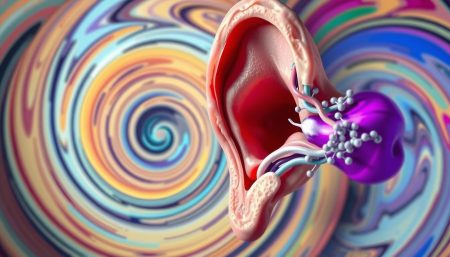Vertigo makes you feel like the world is spinning. It’s a balance disorder that affects millions. Knowing what causes vertigo is key for those seeking relief.
Vertigo can stem from inner ear problems or neurological issues. This article looks at both common and rare causes. We’ll see how unrelated health issues can lead to vertigo and affect daily life.
We aim to shed light on vertigo’s causes. Whether you get dizzy sometimes or always, this guide will help. It’s designed to help you understand your vertigo symptoms better.
Understanding Vertigo: Definition and Basic Concepts
Vertigo makes you feel like you’re spinning or whirling. It also makes you feel off-balance. This condition comes from problems in the inner ear and can really mess up your day. Many people get vertigo mixed up with just feeling dizzy, but they’re not the same thing.
The Difference Between Vertigo and Dizziness
Dizziness is a wide term for feeling unsteady. But vertigo is when you think you’re moving when you’re not. Symptoms of vertigo include feeling like you’re spinning, getting sick, and having trouble staying steady.
How the Balance System Works
Our balance system uses our eyes, inner ears, and nerves. The inner ear’s vestibular system is key to keeping us steady. If it goes wrong, we can get vertigo.
Common Sensations During Vertigo Episodes
When vertigo hits, you might feel:
- A sense of rotation or swaying
- Nausea and vomiting
- Difficulty walking or standing
- Headaches
- Abnormal eye movements
| Vertigo Symptoms | Possible Causes |
|---|---|
| Spinning sensation | BPPV, Meniere’s disease |
| Nausea and vomiting | Vestibular neuritis, Labyrinthitis |
| Balance problems | Inner ear infections, Acoustic neuroma |
| Hearing changes | Meniere’s disease, Ear infections |
Knowing the basics of vertigo can help you spot symptoms early. This way, you can get the right help for your inner ear issues.
What Is The Reason For Vertigo: Medical Perspectives
Doctors see vertigo as a complex symptom with many causes. Vertigo causes often come from problems in the balance system. This system involves the inner ear, eyes, and nerves.
The inner ear is key for balance. If it doesn’t work right, you might feel dizzy or have vertigo. Doctors find several main reasons for this:
- Inner ear infections
- Head injuries
- Certain medications
- Neurological conditions
Doctors use special tests to find out why someone has vertigo. These tests include:
- Electronystagmography (ENG)
- Magnetic Resonance Imaging (MRI)
- Computerized Tomography (CT) scans
Finding the cause is key to treating vertigo. Experts stress the need for a detailed check-up. This helps tell if vertigo comes from the inner ear or the brain.
| Vertigo Type | Origin | Common Causes |
|---|---|---|
| Peripheral | Inner ear | BPPV, Meniere’s disease |
| Central | Brain or spinal cord | Migraines, strokes |
Knowing the exact cause helps doctors give the right treatment. This way, they can fix the balance problems effectively.
Common Types of Vertigo and Their Origins
Vertigo has many forms, each with its own causes and signs. Knowing these types can help find the cause of your symptoms. It also guides the best treatment options.
Peripheral Vertigo
Peripheral vertigo comes from problems in the inner ear. It often causes intense but short dizziness spells. Benign paroxysmal positional vertigo, a common form, happens when crystals in the inner ear get out of place.
Central Vertigo
Central vertigo starts in the brain or brainstem. It usually causes milder but longer-lasting dizziness. Migraines, strokes, or multiple sclerosis can cause this type of vertigo.
Position-Induced Vertigo
This type happens when you change your head position. It’s often linked to benign paroxysmal positional vertigo. Simple actions like rolling over in bed or looking up can cause sudden spinning.
| Type of Vertigo | Origin | Common Causes | Symptoms |
|---|---|---|---|
| Peripheral | Inner ear | BPPV, Meniere’s disease | Intense, brief dizziness |
| Central | Brain or brainstem | Migraines, strokes | Mild, prolonged dizziness |
| Position-Induced | Inner ear crystals | BPPV | Dizziness with head movement |
Knowing the different types of vertigo helps you describe your symptoms better. This leads to more accurate diagnoses and effective treatments.
Benign Paroxysmal Positional Vertigo (BPPV) Explained
Benign paroxysmal positional vertigo, or BPPV, is a common reason for dizziness. It happens when tiny crystals in your inner ear move out of place. These crystals help you sense movement and stay balanced.
With BPPV, certain head movements can cause brief vertigo episodes. You might feel like the room is spinning or tilting. These feelings usually last less than a minute but can be very intense.

- Lie down or sit up in bed
- Roll over in bed
- Tilt your head back
- Bend forward
Doctors can spot BPPV with a simple test called the Dix-Hallpike maneuver. This test involves moving your head in specific ways to check your eye movements.
The treatment for BPPV is a series of head movements called the Epley maneuver. This method tries to move the displaced crystals back to their right spot in the inner ear.
| BPPV Characteristics | Description |
|---|---|
| Duration | Less than 1 minute per episode |
| Trigger | Specific head movements |
| Associated Symptoms | Nausea, loss of balance |
| Treatment | Epley maneuver, home exercises |
Even though BPPV can be scary, it’s not dangerous. With the right diagnosis and treatment, most people can feel better and go back to their usual activities.
Inner Ear Disorders as Primary Vertigo Triggers
Inner ear problems are a common cause of vertigo. The tiny parts in your ear are key to keeping your balance. When these parts get affected, it can cause different types of vertigo.
Vestibular Neuritis Impact
Vestibular neuritis is an inner ear issue that can cause severe vertigo. It happens when the vestibular nerve gets inflamed, usually from a viral infection. This inflammation messes up the balance signals to the brain, leading to sudden, intense dizziness that can last for days.
Labyrinthitis Causes
Labyrinthitis is another inner ear disorder that leads to vertigo. It’s when the inner ear labyrinth, which handles both hearing and balance, gets inflamed. This condition can cause vertigo, hearing loss, and tinnitus. Viral infections are often the cause, but bacterial infections can also lead to it in rare cases.
Acoustic Neuroma Effects
An acoustic neuroma is a non-cancerous tumor that grows on the vestibular nerve. As it grows, it can press on nearby parts, causing balance issues and vertigo. Other symptoms include hearing loss and tinnitus. Though rare, acoustic neuromas can greatly affect your quality of life if not treated.
Knowing about these inner ear disorders is key to finding and treating vertigo causes. If you keep feeling dizzy or have trouble balancing, see a healthcare professional for the right diagnosis and treatment.
Meniere’s Disease and Its Connection to Vertigo
Meniere’s disease is a chronic condition that affects the inner ear. It often causes severe vertigo symptoms. This disorder impacts a person’s daily life in many ways.

Those with Meniere’s disease have recurring vertigo episodes. These can last from 20 minutes to several hours. They also experience hearing loss, tinnitus, and ear pressure.
The exact cause of Meniere’s disease is still unknown. Researchers think it might be due to fluid buildup in the inner ear. This fluid buildup can disrupt balance, leading to vertigo.
“Living with Meniere’s disease is like being on a constant rollercoaster. One moment you’re fine, and the next, the world is spinning around you.”
Treatment for Meniere’s disease aims to manage symptoms and reduce vertigo attacks. Options include:
- Dietary changes (reducing salt intake)
- Medications to control vertigo and nausea
- Vestibular rehabilitation exercises
- In severe cases, surgical interventions
While there’s no cure for Meniere’s disease, managing it can improve life quality. Many people with this condition lead fulfilling lives despite its challenges.
| Symptom | Frequency | Duration |
|---|---|---|
| Vertigo | Episodic | 20 minutes to several hours |
| Hearing loss | Fluctuating | Varies |
| Tinnitus | Persistent or intermittent | Ongoing |
| Ear pressure | Often precedes vertigo | Minutes to hours |
Neurological Causes of Vertigo
Vertigo can come from many neurological problems. These issues affect the brain and nervous system. They can cause balance problems and change daily life a lot. Knowing what causes these problems is key to finding the right treatment.
Migraines and Vestibular Disorders
Migraines are more than just headaches. They can also cause vertigo, known as vestibular migraines. People with this might feel dizzy, like they’re spinning, and have trouble balancing. These symptoms can happen even when there’s no headache.
Brain Stem Conditions
The brain stem is important for keeping our balance. Problems here can lead to serious vertigo. Issues like strokes or tumors can mess up balance signals, causing constant dizziness and trouble coordinating movements. Finding these problems early is very important for treatment.
Multiple Sclerosis Related Vertigo
Multiple sclerosis (MS) can damage nerves that control balance and how we see space. People with MS often feel off-balance or like they’re spinning. These symptoms can change, just like MS does.
It’s important to understand the neurological causes of vertigo. If you’re always feeling dizzy or off-balance, see a doctor. They can figure out what’s wrong and suggest the best treatment. For more health tips, check out this article on common health triggers.
Lifestyle Factors That Can Trigger Vertigo
Your daily habits can greatly affect vertigo and dizziness. Stress is a big trigger for many. When stressed, your body tightens, which can mess with your balance.
Relaxation techniques like deep breathing or yoga can help. They can reduce vertigo episodes.
What you eat and drink also matters. Foods high in salt or sugar can worsen vertigo. Caffeine and alcohol might trigger symptoms too.
Keeping a food diary can help you spot problem foods. Staying hydrated is crucial for vertigo treatment.
Sleep is another key factor. Not enough rest can make you more dizzy. Try to keep a regular sleep schedule.
Exercise can help, but start slow. Gentle activities like walking or swimming are good. Always check with your doctor before starting a new workout.
By focusing on these lifestyle factors, you might reduce vertigo symptoms. Remember, what works for one person might not work for another. Work with your healthcare provider to find the best treatment plan for you.
FAQ
Q: What is the main difference between vertigo and dizziness?
A: Vertigo is a type of dizziness where you feel like you’re spinning, even when you’re not. Dizziness is a broader term that can make you feel lightheaded or unsteady. Vertigo often comes from problems in the inner ear or brain, while dizziness can have many causes.
Q: What are the most common causes of vertigo?
A: Common causes of vertigo include Benign Paroxysmal Positional Vertigo (BPPV), inner ear infections, and Meniere’s disease. Migraines and certain brain conditions can also cause it. Less common causes include acoustic neuroma and multiple sclerosis.
Q: How long do vertigo episodes typically last?
A: Vertigo episodes can last from seconds to days, depending on the cause. BPPV episodes are brief. Vestibular neuritis can last several days. Meniere’s disease attacks can last from 20 minutes to hours. Some people have chronic vertigo.
Q: Can stress trigger vertigo?
A: Yes, stress can trigger vertigo in some people. Stress doesn’t directly cause vertigo but can make it worse. Stress management can help reduce vertigo episodes.
Q: What is Benign Paroxysmal Positional Vertigo (BPPV)?
A: BPPV is the most common vertigo. It happens when tiny crystals in the inner ear move into the semicircular canals. This causes a false sense of movement with head changes. BPPV is known for brief, intense vertigo episodes triggered by head movements.
Q: How is vertigo diagnosed?
A: Doctors diagnose vertigo through medical history, physical exams, and tests. They might use the Dix-Hallpike test for BPPV or electronystagmography (ENG) for eye movements. Imaging studies like MRI or CT scans are also used to check for neurological causes. Hearing tests and balance assessments are part of the diagnosis too.
Q: What treatments are available for vertigo?
A: Treatment for vertigo varies based on the cause. Options include:
- Canalith repositioning procedures (like the Epley maneuver) for BPPV
- Vestibular rehabilitation exercises
- Medications such as antihistamines, anti-nausea drugs, or diuretics
- Lifestyle changes to manage triggers
- In rare cases, surgery may be necessary
Q: Can vertigo be prevented?
A: While not all vertigo can be prevented, there are ways to reduce risk or manage symptoms:
- Stay hydrated and maintain a balanced diet
- Manage stress levels
- Avoid sudden head movements
- Practice good sleep hygiene
- Engage in regular exercise to improve balance
Q: Is vertigo a sign of a serious health condition?
A: Vertigo itself is not usually serious, but it can be a sign of something more serious. Rarely, it can be linked to stroke, brain tumors, or multiple sclerosis. If you have sudden, severe vertigo with other symptoms, seek medical help right away.
Q: How does Meniere’s disease relate to vertigo?
A: Meniere’s disease is an inner ear disorder that causes vertigo, hearing loss, tinnitus, and ear fullness. The vertigo from Meniere’s can be severe and last hours. The exact cause is unknown, but it’s thought to be related to fluid buildup in the inner ear.


















